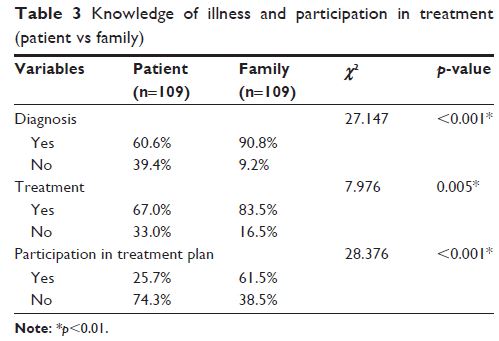9 0 8 0 2
论文已发表
注册即可获取德孚的最新动态
IF 收录期刊
- 2.6 Breast Cancer (Dove Med Press)
- 3.9 Clin Epidemiol
- 3.3 Cancer Manag Res
- 3.9 Infect Drug Resist
- 3.6 Clin Interv Aging
- 4.8 Drug Des Dev Ther
- 2.8 Int J Chronic Obstr
- 8.0 Int J Nanomed
- 2.3 Int J Women's Health
- 3.2 Neuropsych Dis Treat
- 4.0 OncoTargets Ther
- 2.2 Patient Prefer Adher
- 2.8 Ther Clin Risk Manag
- 2.7 J Pain Res
- 3.3 Diabet Metab Synd Ob
- 4.3 Psychol Res Behav Ma
- 3.4 Nat Sci Sleep
- 1.9 Pharmgenomics Pers Med
- 3.5 Risk Manag Healthc Policy
- 4.5 J Inflamm Res
- 2.3 Int J Gen Med
- 4.1 J Hepatocell Carcinoma
- 3.2 J Asthma Allergy
- 2.3 Clin Cosmet Investig Dermatol
- 3.3 J Multidiscip Healthc

上海市精神分裂症住院患者对诊疗的知识水平偏低
Authors Huang J, Chiovenda A, Shao Y, Ma H, Li H, Good MJDV
Received 29 September 2017
Accepted for publication 9 November 2017
Published 4 January 2018 Volume 2018:14 Pages 185—191
DOI https://doi.org/10.2147/NDT.S152917
Checked for plagiarism Yes
Review by Single-blind
Peer reviewers approved by Prof. Dr. Roumen Kirov
Peer reviewer comments 2
Editor who approved publication: Professor Wai Kwong Tang
Objective: The study was designed to measure the level of knowledge of the
diagnosis of illness and its treatment among patients with schizophrenia in
China, and to examine the association between the capacity to provide informed
consent and participation in treatment.
Participants and
methods: A cross-sectional study
was conducted at three clinical inpatient sites in Shanghai, China, during
2015. Patients’ knowledge of the illness, as well as the knowledge of the
patients’ families and psychiatrists, was determined. Logistic regression was
used to determine the factors associated with patients’ knowledge of
schizophrenia.
Results: Out of 109 enrolled schizophrenic inpatients
(mean age 42.46±1.29 years), 60.6% were aware of their diagnosis and 67.0% knew
details of their treatment plan. The group with unimpaired capacity for giving
informed consent had a greater knowledge of their diagnosis (χ 2=5.002, p =0.038) and of their treatment
plan (χ 2=11.196, p <0.01) in comparison with
patients who were regarded to be impaired. Using logistic regression analysis,
it was found that patients’ capacity to give informed consent to treatment was
associated with the level of knowledge surrounding the diagnosis (odds ratio
=3.230, p <0.05) and the level of
knowledge of treatment (odds ratio =4.962, p <0.01).
Conclusion: The level of knowledge reported by inpatients with
schizophrenia was low with respect to the diagnosis of schizophrenia and of the
treatment associated with this illness. An association between patients’
capacities for giving informed consent and knowledge of their illness was
confirmed in the present study. The results suggest that, in clinical practice,
the informed consent process should be strengthened to protect the interests of
patients with schizophrenia.
Keywords: ethics,
informed consent, schizophrenia, illness knowledge
